John Hawkes The Sessions
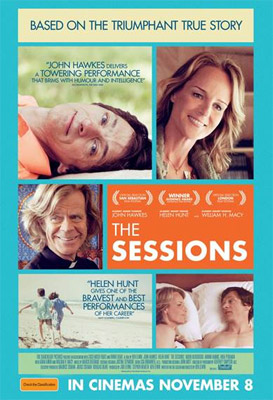
The Sessions
Cast: John Hawkes, Helen Hunt, William H. MacyDirector: Ben Lewin
Genre: Drama
Rated: MA
Running Time: 95 minutes
Synopsis: The Sessions is based on the true story of California-based journalist and poet Mark O'Brien. Portrayed by the exceptionally gifted Hawkes - who gives a career-defining performance, O'Brien's story is the immensely poignant and surprisingly funny tale of a man, paralysed by polio, who - at age 38 - is determined to finally lose his virginity.
Release Date: November 8th, 2012
Director's Statement
Mark O'Brien's article, "On Seeing a Sex Surrogate," was effectively the blueprint for the screenplay of The Sessions, but my take on the subject matter and the characters changed and expanded as the journey progressed. For instance, in tracking down the rights to the article, I came across one of the most gratifying ironies of Mark's story - what he thought would never happen - did, in fact happen.
Mark had given up hope of ever having the kind of close and enduring relationship with a woman that non-disabled people seemed to enjoy, and he expressed this in his article. His tone was sad, despondent and pessimistic, but the melancholic ending he wrote had an unexpected and joyful coda: her name was Susan Fernbach.
In the last few years of his life, Susan was his lover, companion and literary collaborator. She described their time together as magical. Apart from the positive ending that she represented, her insights and intimate observations of Mark made it possible to construct a different and more complex screen character than I would otherwise have been able to conceive.
The other event that significantly changed my approach to the screenplay was meeting and getting to know Cheryl Cohen-Greene, the original surrogate, now a grandmother and still practicing her craft. Her candor and the detail of her recollections helped me redefine a biopic into a relationship movie that I felt much more confident writing.
I believe there is a popular assumption that filmmaking is fun. I don't know where people get this idea. Certainly, the anticipation can be fun, and the result can sometimes be fun but, for me, the actual filming is typically very stressful, every day is peppered with conflicts and misunderstandings, and it is a relief to get home and go to bed.
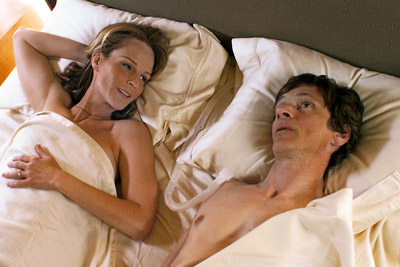 But The Sessions was the exception that proved the rule. Shooting this movie was a unique experience. It was beyond fun, it was joyful and, when it was over, it was painfully sad.
But The Sessions was the exception that proved the rule. Shooting this movie was a unique experience. It was beyond fun, it was joyful and, when it was over, it was painfully sad. - Ben Lewin
Director/Writer, The Sessions
About the Production
"I was undressed, she was undressed, and it seemed normal. How startling!I had half-expected God - or my parents - to keep this moment from happening."
- Mark O'Brien, On Seeing a Sex Surrogate
The Sessions is the true story of poet and journalist Mark O'Brien who, at the unlikely age of 38, sets out to lose his virginity - under rather challenging circumstances. Veteran actor John Hawkes plays O'Brien in a powerful performance that transcends the physical limitations of the role.
Having survived a bout of childhood polio, O'Brien spends a significant part of his time in an iron lung for all but a few hours each week. Most would have difficulty imagining that he could lead an ordinary love life -- but not being ordinary did not stop Mark. Ferreting out the humour, optimism and even faith from his tricky situation, Mark is determined to taste all he possibly can of life, including the emotional and physical pleasures that had eluded him. So, he makes the bold decision to stop dreaming of love and hire a pro: a sex surrogate who can give him a chance at experiencing intimacy in his own inimitable way.
The funny, moving and life-changing set of lessons that ensues in these surrogate sessions became the topic of O'Brien's 1990 article "On Seeing a Sex Surrogate," which he published in the literary magazine The Sun. The article broke wide open the taboo of talking publicly about sex and disability, but did it in such an honest, witty and warm way that it seemed anyone, no matter who they were, could relate.
One person who related to O'Brien's story on an especially personal level was filmmaker Ben Lewin. Like O'Brien, Ben Lewin had contracted polio as a child. Like O'Brien, it didn't keep him from a successful career. When Ben Lewin stumbled upon O'Brien's sex surrogate article on the internet, he felt it could be the basis of a film. Was it possible to make a dynamic, relatable and even deeply moving film about a man with a significant disability? Taking his cue from O'Brien's writing, Ben Lewin envisioned something humour-filled and unsentimentally true to life. He saw the script as not just about a guy's middle-aged quest to end his virginity but about how a man comes to terms with his body, his manhood and the full measure of what makes a life worth living.
Ben Lewin then brought this unusual tale to life with a devoted cast in roles unlike any on screen - with John Hawkes portraying O'Brien, Helen Hunt taking on Cheryl Cohen-Greene, and William H. Macy as the priest who lends Mark his blessing, and his ear, as he attempts to explore life's mysteries. The film premiered at the Sundance Film Festival, where it took home the coveted Audience Award and the Jury Prize for ensemble cast.
Ben Lewin says he always saw The Sessions as a love story - albeit a different kind from any most people have ever seen. "It doesn't follow the usual blueprint of love stories," he admits. "But I felt if I could do with the film what Mark had done to me with the power and authenticity of his writing, that would be something. I think his story is something genuinely unexpected."
While Ben Lewin's own experience with polio gave him an authentic perspective, he says his first loyalty was to getting O'Brien's razor-sharp and lyrical voice on the screen. "I was also in an iron lung when I first contracted polio, but I don't remember the experience," the writer-director explains. "Gradually I recovered the use of my upper body and some use of my lower limbs. I think Mark's emotional journey was unique to him and, at the same time, I think it will be relatable to many people."
Since O'Brien himself passed away in 1999 at the age of 49, Ben Lewin relied on his writings, interviews and also on O'Brien's eventual life partner, Susan Fernbach -- whom O'Brien met after Cheryl Cohen-Greene. Together they created a rich, life-like portrait of a man known for his biting honesty and his sharp self-depreciating wit.
"Susan Fernbach was my major window into who Mark was, and was a kind of soul mate for me as the script and film progressed," says Ben Lewin. "She gave me a lot of insight into Mark and related many funny and harrowing events that actually happened to him. Things like the fact that the cat would sometimes brush past his nose and make him itch insufferably - that was from real life," comments Ben Lewin. "And Cheryl Cohen-Greene did take a mirror into one of her sessions and say to him 'This is your body.' When the power cuts out on his iron lung, that is also true. It seems these might be made up for dramatic purposes, but they're not. It was just a matter of figuring out where these real events would work best in the narrative."
As he wrote, Ben Lewin also got to know Cheryl Cohen-Greene, the woman who grew to admire O'Brien as she dove into new territory with him in their sessions: Cheryl Cohen-Greene was direct and open with the writer/director. "The first meeting with Cheryl Cohen-Greene was a crucial event. At one point, she asked if I minded if she referred to her notes," Ben Lewin recalls. "'Notes?' I thought. They were the notes of a clinical therapist, not of a sex worker. For the first time, I had an insight into what a fascinating person she was."
He continues: "She really helped to transform the movie from what could have been a biopic into the story of relationships. Having her side of the story was a real treasure because it became a journey for two people."
To join these two real-life characters who so profoundly touched one another's lives, Ben Lewin invented a third - Father Brendan, a fictional parish priest who is based on the reality that O'Brien was a practicing Catholic who, in his angst over the moral predicament of his virginity, consulted several priests, at least one of whom recommended that he have sex. "Religion was a fundamental part of Mark's life, and I felt it was important to reflect that, as well as his idea that sex had a spiritual dimension," says Ben Lewin. "It's also true that he had several close relationships with priests."
O'Brien's engaging descriptions of his sessions undoubtedly came in part from his expressive side as a poet and Ben Lewin wanted to capture this on screen. Ben Lewin opens the movie with an O'Brien poem about the act of breathing, which helps to drop the audience into his exceptional reality. "Breathing was a very important aspect of Mark's life, which is something everyone else takes for granted," notes Ben Lewin.
Ben Lewin began working with Such Much Films producer Judi Levine -- who also happens to be his wife - to find support in the filmmaking world. As Judi Levine watched the screenplay develop, she was sure it would inspire others. "The film works on several levels -- as the story of a guy who wants to lose his virginity, as a story that shows how much people are capable of enduring and as a story about what it's like to have that first experience of sex, no matter who you are… I think that's why the audiences who have seen it so far have universally responded to it," she says.
Producer Stephen Nemeth, head of Rhino Films, also had a visceral emotional response to the script. "I fell in love," he summarises. "I've always been intrigued by Ben Lewin's intellect and his wicked sense of humor, and that is what he brought to this story. It is a story that could easily have been maudlin, but he nailed it tonally in all the right ways. The story has some tragedy, but you don't feel sorry for anyone. The story is also hysterically funny, but it's not quite a comedy. It's a story about perceived underdogs and it is unexpectedly triumphant."
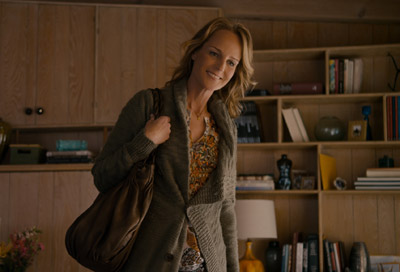 "I doubted I deserved to be loved. My frustrated sexual feelings seemed to be just another curse inflicted upon me by a cruel God."
"I doubted I deserved to be loved. My frustrated sexual feelings seemed to be just another curse inflicted upon me by a cruel God."-Mark O'Brien, On Seeing a Sex Surrogate
In the last couple of years, actor John Hawkes has played some of the most complex characters and grittiest roles in cinema and television - including his Oscar®-nominated turn as the backwoods meth dealer who tries to help his niece in Winter's Bone, the Wild West merchant Sol on "Deadwood," and an alluring cult leader in Martha Marcy May Marlene. In playing Mark O'Brien in The Sessions, John Hawkes takes on another memorable role capturing O'Brien's untiring spirit, self-effacing wit and the significant physical challenges that take him into a very different daily reality.
When he received the script, John Hawkes had a tower of high-profile screenplays to choose from. But The Sessions stood out from the pack. "Bottom line, it was the script that got me," says John Hawkes. "It was just such a beautifully drawn story. It reviews just a small piece of Mark O'Brien's whole life - but in doing so, it tells us something powerful."
Ben Lewin was thrilled to have John Hawkes take on the role. "Here was an unbelievable actor who was ready to go to extraordinary and painful lengths to portray O'Brien's true physicality so as to give a more genuine performance. Once you have that person, you know you have a great starting place," the director says.
The two met early on for lunch in Los Angeles. "I was as charmed by Ben Lewin as I was by his wonderful script," John Hawkes recalls. "We had a very interesting talk. My first concern and question to Ben Lewin was 'Have you considered an actor with a disability for the part?' He told me he spent a great deal of time auditioning many actors, some with disabilities and some of whom ended up in the movie in other roles. But there were qualities that he was looking for that he wasn't seeing in others so he considered me. And I'm glad he did."
"After I first read Mark's article, there was no doubt in my mind that I wanted to use a performer with a disability to play Mark. I wanted the telling of the story to feel as authentic as possible and this seemed to be the perfect starting point," said Ben Lewin. "I reached out and sent the script to three disability-access organisations in New York, Los Angeles and San Francisco, but without result. In the end, we hired two excellent disabled actors, Jennifer Kumiyama and Tobias Forrest to play the other characters with disabilities in the film. They had substantial speaking roles, they came with strong acting experience and had excellent comic timing. I would work with them again in a heartbeat."
Once John Hawkes signed on, he began intensive preparation, which started with reading Mark's poetry, articles and his autobiography, How I Became A Human Being, including the essay on which the film is based, getting to know O'Brien from the inside out. "I came to think of him as both a writer and a fighter," he explains. "He was a guy who was interested in justice, not just for people with disabilities, but human justice. He was someone who wanted to fight the good fight. He was also not a person who felt sorry for himself very often. So, from an acting standpoint, it was important to fight reflecting self-pity at all times."
John Hawkes was already familiar with the 1996 Oscar®-nominated short documentary about O'Brien, Jessica Yu's Breathing Lessons - a 35-minute film in which the camera focuses on O'Brien talking openly about life, death, sex, work and poetry from inside his iron lung. The intonation of O'Brien's distinct voice and the imagery of his mannerisms became an invaluable resource. "I think I would have portrayed Mark differently if that documentary didn't exist," he reflects. "It presented a chance to capture his voice, witness his determination and experiences, as well as understand the way the iron lung affected his breathing."
In addition, John Hawkes consulted those who knew O'Brien well, especially his life partner Susan Fernbach, who emphasised Mark's indefatigable sense of humour. "Susan Fernbach told me that when she and Mark were together they often laughed because 'how much worse could it be?' They had a sense of humour about everything; they called themselves 'a horizontal lover and a vertical lover.'" Hawkes wove that humour through his performance. He explains: "Humour that comes out of low points is always the most interesting to me."
Mark's spirited attitude was paramount, but John Hawkes also wanted to realistically address O'Brien's body, which had long been an obstacle to the love he sought. While many people believe those with polio have no feeling in their limbs, that is far from the case. They have the same amount of feeling as anyone else, but lack the motor neurons to move their muscles. John Hawkes wanted to portray O'Brien's resulting altered physique without any kind of body double.
"I knew I would have to contort my body," he says. "Mark only had about 90 degrees of motion with his head and his spine was significantly curved so I began with that reality. You can't just fake that so, along with the props department, we designed something with a soccer-sized foam ball that I put under the left side of my spine to curve it without any special effects make-up or CGI."
John Hawkes admits that his own chiropractor warned him about damaging his own body with this body-altering device - dubbed "The Torture Ball" -- but he says what he went through to play the role was nothing compared to O'Brien's lived experience minute by minute, day by day.
Diving deeper, John Hawkes would spend weeks learning to work a mouth-stick with enough dexterity to dial the phone and type out articles. He also explored spending time in the narrow realm of an iron lung. "It was quite spooky when John entered the iron lung for the first time," admits Ben Lewin. "It felt very real."
Yet once production began, John Hawkes let go of all the rigid physical training he endured. "I tried to kind of forget all of it when the camera rolled," he explains. "I tried to have it all inside me enough to look the other person in the scene in the eye, tell the truth and have a conversation."
For John Hawkes there was another aspect to the challenge: allowing Mark to get as emotionally naked as he gets physically naked with Cheryl in their sessions. It is in those scenes - love scenes that break the mold in every way - that Mark's spirit emerges. Key to this was the organic rapport John Hawkes developed with Helen Hunt. He says of working with her: "She was very daring to accept the role in the first place and then she just stepped up and embodied it, physically and emotionally."
Says Helen Hunt of working with John Hawkes: "In these few weeks of shooting we got to kind of hold hands and go into this totally un-chartered territory. I felt so lucky to be working with somebody whose talent is shining so radiantly at you."
Ben Lewin observes that since John Hawkes and Helen Hunt never met, that unfamiliarity only enhanced the precarious intimacy of their scenes together. "There was a nervousness the actors had on a personal level that worked very positively in the story because the whole point of the beginning of Mark and Cheryl's relationship is how anxious they were, how openly fearful he was and how secretly fearful she was. When John Hawkes and Helen Hunt got into bed for the first time, it was a blank page. Whatever they did, it was going to be totally fresh and new."
For Mark O'Brien's life partner, Susan Fernbach, John Hawkes' transformation was a haunting reminder of Mark's spirit. "When he smiled exactly like Mark; it was as if he was channeling him," she says. "It gave me goose bumps."
"I asked Cheryl whether she thought I deserved to be loved sexually.
She said she was sure of it."
- Mark O'Brien, On Seeing a Sex Surrogate
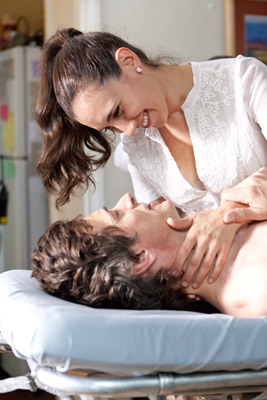 While many unconventional professions have become film subjects, sex surrogacy has not been among them. It's an unusual, easily misunderstood job - part psychologist, part coach, part hired sex partner. Mark's ice-breaking sessions with Cheryl Cohen-Greene, the married Berkeley surrogate who agreed to take him on as a client despite his considerable disability, paved the way for him to experience true intimacy with a woman.
While many unconventional professions have become film subjects, sex surrogacy has not been among them. It's an unusual, easily misunderstood job - part psychologist, part coach, part hired sex partner. Mark's ice-breaking sessions with Cheryl Cohen-Greene, the married Berkeley surrogate who agreed to take him on as a client despite his considerable disability, paved the way for him to experience true intimacy with a woman. To give Cheryl the open-minded, uninhibited mix of toughness and tenderness she needed to go on this journey with Mark, the filmmakers turned to Helen Hunt (As Good As it Gets, "Mad About You"), the Academy Award® winning actress known both for her dramatic versatility and deft comic touch.
"What Helen Hunt brings to the role is a real sense of Cheryl's journey, how she not only changes Mark but how little by little, her own vulnerability emerges to the point that you stop seeing her as a surrogate and start to see her as a woman," says Ben Lewin. "One of the things that Helen Hunt brought to the character is a kind of edge - an attitude of 'I'm not a charity worker. We're here to do a job, so let's get down to business.' But you see her vulnerability when she is undressing Mark in their first session. When she says to him for the second time, 'nice shirt,' you start to see that this woman is not quite as tough as she came on at the beginning."
It was the unique way in which the layers of the script unfolded that grabbed Helen Hunt. She was intrigued by the challenge of giving Cheryl her due as a professional like any other - and one who passionately believes in the importance of sexuality to human identity. "Probably the rarest thing in my profession is a good story and I thought this one was beautiful," Hunt says. "It was bold and not like anything I'd read before. Cheryl is someone people might think they know, but she very quickly defies your expectations. She fired me up with her positive extroversion, her Boston accent and the way she saw the world and sex in particular."
Helen Hunt also found that, like Cheryl, she related to Mark under the skin. She explains: "I found his story to be not about what it's like to have polio but what it is like to have a body, whatever shape it's in. This is a really positive look at sexuality."
Helen Hunt admits that she knew next to nothing about sex surrogacy before she took on the part and met Cheryl. But she quickly found that it's a serious profession -- even if it gets into some awkward territory -- one that helps people heal.
"I can only speak about the one sex surrogate I came to know, Cheryl, but I think having your life's work be helping people have pleasure in their lives and not feel weird or hung up about things, that's a beautiful thing," Hunt comments. "Cheryl was very enthusiastic about the movie, very open and very generous of spirit . . . I asked her everything. And I found that she was someone who came to this profession as a kind of calling."
"It was a calling," says Cheryl Cohen-Greene, who was excited to share her memories and experiences with Helen Hunt. "I found it the ideal work because I was on a quest of my own to feel more comfortable in my skin and with my own sexuality. Helen Hunt was interested in every detail of how I talked to Mark in our sessions. She paid a lot of attention to how I would have touched him. I was so happy to see she used her hands the way I would have in the film."
Like the real Cheryl, Helen Hunt determined she would be forthright, fearless and completely unconstrained in her interactions with John Hawkes' character. Working with John Hawkes, she could see how a surrogate walks a razor's edge. "When you open your heart to someone, you really open your heart," she muses. "I think with Mark, Cheryl tries to open her heart just enough to close it again, but she's not perfect at it."
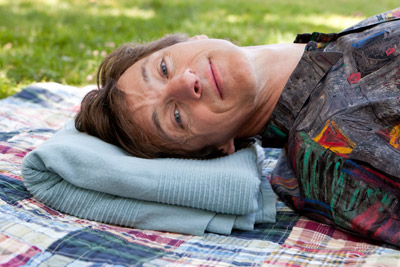 Their scenes were starkly, sometimes unexpectedly, emotional but Helen Hunt also came to appreciate the comedy inherent in a 38 year-old having his first intimate encounter. "Being really scared about something and wanting it really badly at the same time can be quite poignant and funny," she observes.
Their scenes were starkly, sometimes unexpectedly, emotional but Helen Hunt also came to appreciate the comedy inherent in a 38 year-old having his first intimate encounter. "Being really scared about something and wanting it really badly at the same time can be quite poignant and funny," she observes. Ultimately, Helen Hunt says she hoped to capture all the shadings of Cheryl's time with Mark by being as natural as possible while, at the same time, keeping things upbeat and sexy, just as Cheryl did in their sessions. She concludes: "Like any work that means anything, this one asked for courage and vulnerability. It's just this film asked for a little more than usual."
"I wanted to be loved. I wanted to be held, caressed, and valued.
But my self-hatred and fear were too intense."
- Mark O'Brien, On Seeing a Sex Surrogate
The person who first starts talking sex with Mark O'Brien in The Sessions is an unlikely one: his priest, Father Brendan, who finds himself chatting openly with his parishioner not only about faith and conviction but the flesh-and-blood mechanics of losing his virginity.
Taking the role is William H. Macy, whose broad range spans from his Oscar® nominated work as hapless Jerry Lundegaard in the Coen Brothers' classic Fargo to his Emmy®-winning role as a salesman with cerebral palsy in "Door To Door" to his current role as the single father to a large dysfunctional brood on Showtime's hit comedy "Shameless."
William H. Macy was initially attracted by the subject matter. "It was an unusual script that was very well done," he says. "I liked, first of all, that this is the story of a guy with tenacity and boldness, who says 'I want to experience this; I want to be in love; I want to know what sex feels like.' And second, I liked that he makes this happen in a time and place when such things were possible, in the wild and woolly 70s and 80s in San Francisco. It's a great story and I hope it resonates."
The first task for William H. Macy was approaching Father Brendan on his own terms - as a man of the cloth trying to do the moral thing even if, ironically, that means helping a member of his flock to have paid sex, which under other circumstances could certainly be construed as a sin. "I love this priest because he is a good man and he makes a beautiful decision," says William H. Macy. "Father Brendan thinks about Mark's situation and he says 'I know in my heart that God will give you a free pass on this one. Go for it.' And I adore that about him."
Still, William H. Macy understood that it wouldn't come easy to Father Brendan, especially once the shoot began in a real, functioning church. "Shooting in this magnificent California church, we all felt a little squeamish talking about sex," he confesses. "But I think what steels Father Brendan is that he believes his church is a place to talk about important things and sex is important."
Finding a sly mix of humor and compassion in his rapport with John Hawkes also helped William H. Macy to bring the role alive. "John Hawkes is the real deal," he comments. "He plays this very complex role with a light touch that I really enjoyed. There's a twinkle in his eye, but he also digs deep. He doesn't add anything but he doesn't deny anything. It was such great fun to work with him in this role."
Most of all, William H. Macy appreciated Ben Lewin's emphasis on the comedy of the situation, even amidst the story's vivid emotions. "When I talked with Ben about doing this, we both agreed that it was important to really bring out the humour," concludes William H. Macy. "And I think that is what helps the audience want to get to know these characters so fully."
John Hawkes was grateful for the chance to work so closely with William H. Macy. "I was elated when I found out he wanted to play Father Brendan. I was beside myself," he recalls. "He brings such an essential quality because, while Mark has a lot of humor about him, Bill brings a different kind of humour and a humor that is so needed in the film. It comes from his bringing the truth to it."
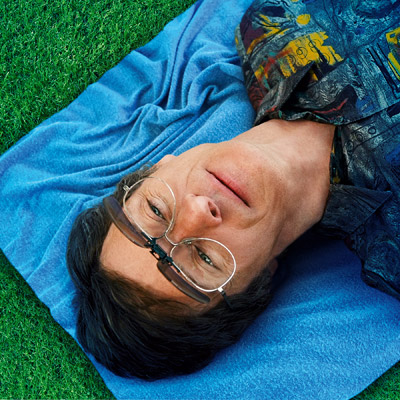 "I fear getting nothing but rejections. But I also fear being accepted and loved. For if this latter happens, I will curse myself for all the time and life that I have wasted."
"I fear getting nothing but rejections. But I also fear being accepted and loved. For if this latter happens, I will curse myself for all the time and life that I have wasted."- Mark O'Brien, On Seeing A Sex Surrogate
Joining John Hawkes, Helen Hunt and William H. Macy in The Sessions is a supporting cast who take on the key roles of O'Brien's friends and personal attendants as he embarks on his quixotic middle-aged quest to know sexual intimacy. They include Moon Bloodgood as Vera, the architectural student who accompanies him to his sessions; Annika Marks as O'Brien's crush-worthy carer Amanda; Rusty Schwimmer as Joan, Mark's most humorless caretaker; Jennifer Kumiyama as Carmen, whose sex life as a disabled woman encourages O'Brien to pursue his plan; and Adam Arkin as Cheryl's husband, who watches suspiciously when she receives a love poem from O'Brien.
They all knew that the film would be an experience different from others. "I'd never heard of sex surrogates for people with disabilities," says Moon Bloodgood. "And my character Vera isn't like any I've played before. She doesn't say much, but she's a doer. At first, she thinks this is just a job, but she slowly starts to really care about O'Brien. She's funny because she's so direct, to the point, and no-nonsense." Annika Marks was drawn to the role of Amanda, despite the fact that she is the attendant who rejects his besotted affections. "She breaks his heart but that's the catalyst for him to go on this quest for intimacy," she explains. "She really does love him, but not in that way."
It was especially thrilling for Annika Marks to work so closely with John Hawkes. "He was so incredible, I don't have words for it," she goes on. "Despite the physical and emotional demands of the role he was always the most generous person on set."
Rusty Schwimmer had worked with John Hawkes in The Perfect Storm, but this was completely different, playing the attendant least compatible with O'Brien. "What's fun about Joan is that she's assisting this man with significant disabilities who has a golden sense of humour, and she's got squat in the humour department! It was interesting to play someone humourless when I'm someone who sees humour in everything."
Another important woman in O'Brien's life is Carmen, a friend from the disability community with a very satisfying sex life. She is played by Jennifer Kumiyama, who makes her film debut in The Sessions. Kumiyama, who was born with a rare birth disability and was crowned Miss Wheelchair-2010, says that she needed little preparation to take on the role of Carmen. "I myself don't make any excuses for who I am or what I believe or how I feel or how comfortable I am with my body or my sexuality so it didn't really take much for me to relate to Carmen," she says.
But Jennifer Kumiyama does believe that if the film gets people talking more openly about sex and disability, that is a very good thing. "I hope this film will bring a lot of awareness to the non-disabled community because people don't usually see those of us in the disability community in a sexual light. It's never 'hey look at that hot girl'; it's always 'hey, look at that hot girl in the chair.' There is always the chair or the disability attached to it. So I think this story is going to open a lot of people's minds and shatter myths."
For Adam Arkin, the role of Cheryl's husband was also eye-opening, as he imagined what it would be like to have a wife who explores the mechanics of intimacy with other men as her day job. "I could imagine it - but I imagine that it would be filled with challenges," Adam Arkin confesses. "Even for the most evolved of people. Most people's sexuality comes with a certain sense of attachment and issues of possessiveness so I think it would definitely be a challenge."
"My desire to love and be loved sexually is equaled by my isolation and my fear of breaking out of it.."
-Mark O'Brien, On Seeing a Sex Surrogate
The Sessions traverses two contrasting worlds: the free-wheeling, anything goes atmosphere of Berkeley and Mark O'Brien's personal realm as he leads a full life inside the narrow confines of his iron lung. To bring both to life, Ben Lewin worked with a creative team that includes cinematographer Geoffrey Simpson, editor Lisa Bromwell, production designer John Mott and costume designer Justine Seymour, who focused on an understated realism that allows the characters and their inter-relationships to be front and center.
Geoffrey Simpson used the Red One digital camera to get up close with the cast even in the most awkward and vulnerable moments. "Geoffrey Simpson was just the most sensitive DP," says Helen Hunt. "He had a sense of humour when you needed it and he gave you quiet when you needed that. He made the atmosphere as perfect as it could be for the very intimate scenes."
John Mott also aimed for a subtlety in the film's design, bringing in period details that added flavor to the story without ever distracting from it. "The humour of the script was really important so I didn't want there to be humor in the design. The comedy had to come out of the dialogue and the situations. I thought these things were really crucial to the story's appeal," he explains.
He contrasted Mark's small, spare apartment which was largely dedicated to his iron lung with the more exotic locations where he meets Cheryl -- his disabled friend's romantic, Japanese-inspired bedroom where their first sessions take place and then the typical mid-Century California motel room, which Mott built on a soundstage. As for Mark's iron lung, John Mott borrowed perhaps the last working machine in the state of California from the Rancho Los Amigos National Rehabilitation Center in order to bring complete authenticity to John Hawkes' portrayal.
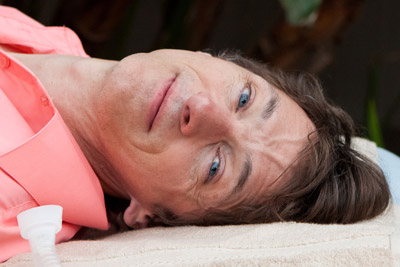 One of the most important things John Mott wanted the design to convey is that this was a time before instant communication, when there were major logistical challenges for someone in Mark's position to live independently, with the daily help of personal care attendants. "He had real issues with communication," he says. "It was important to have all the right stuff near his iron lung - such as his phone and his mouth stick. All these things were a real part of his life and we needed to show that."
One of the most important things John Mott wanted the design to convey is that this was a time before instant communication, when there were major logistical challenges for someone in Mark's position to live independently, with the daily help of personal care attendants. "He had real issues with communication," he says. "It was important to have all the right stuff near his iron lung - such as his phone and his mouth stick. All these things were a real part of his life and we needed to show that." Working with scenes involving a physically stationary lead character also pushed editor Lisa Bromwell in new directions. "Usually, you make cuts on motion," she explains, "but on this film we had to throw that out, and we cut on emotion, which is very hard. But we had these extraordinary performances and when you have a great performance you can do almost anything with it."
Sums up Ben Lewin: "I want the audience to feel that this movie is very different. That they haven't been through this kind of experience before and that it is something unexpected. I would like to think that this movie is a kind of catharsis - you see it to feel emotion and express emotion yet, at the same time, enjoy the experience. I hope people leave the theatre thinking about life in a broader sense, even if they're not philosophers, to think outside themselves."
MORE
- Emma Stone Magic in the Moonlight
- Jessica De Gouw Cut Snake
- Maxine Peake Funny Cow
- Denzel The Equalizer 2
- Johnny Flynn Beast
- Logan Marshall Green Upgrade
- Shailene Woodley Adrift
- Eric Toledano and Olivier Nakache C'est La Vie...
- André Leon Talley The Gospel According To André...
- Shakespeare In Tokyo
- Mission: Impossible Fallout
- Glenn Close The Wife
- Allison Chhorn Stanley's Mouth Interview
- Benicio Del Toro Sicario: Day of the Soldado
- Dame Judi Dench Tea With The Dames
- Sandra Bullock Ocean's 8
- Chris Pratt Jurassic World: Fallen Kingdom
- Claudia Sangiorgi Dalimore and Michelle Grace...
- Rachel McAdams Disobedience Interview
- Sebastián Lelio and Alessandro Nivola...
- Perri Cummings Trench Interview



